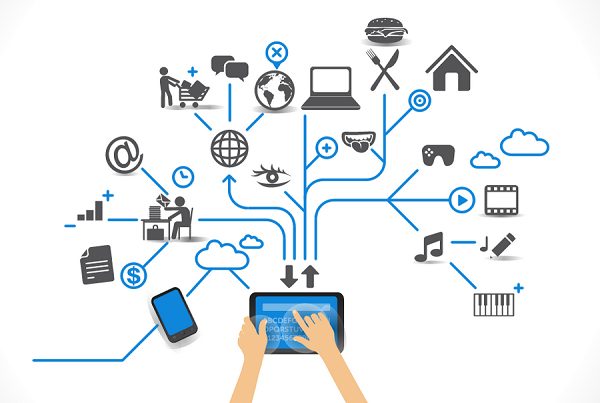
The Ultimate Guide to Blockchain Implementation
Looking for the ultimate guide to blockchain implementation? In this article, I aim to examine in more detail how to integrate blockchain technology into your project and what the benefits will be of doing so.
In this article
- How to Implement Blockchain Technology
- Integrating Blockchain Technology: The Key to Success Lies in Planning
- Putting Together the Right Blockchain Implementation Team
- Review Smart Contracts While Integrating Blockchain Technology
- Blockchain Technology Implementation
- Frequently Asked Questions on Blockchain Implementation
Blockchain technology is projected to increase to nearly $1,000 trillion by 2032. Before I talk about how companies can implement blockchain technology into their projects, it is worth examining what benefits blockchain offers.
The really exciting thing about blockchain technology is that it doesn’t require any form of centralized control. Rather, it operates as a peer-to-peer network that any one party does not control. Each participant in the network is known as a node, and each node has equal control over the ledger.
Whenever a transaction is made on the blockchain, all the participating nodes must authenticate and approve the transaction. Since each node has a blockchain record, features such as security and transparency are, in many ways, improved compared to conventional systems.
The advantages of not relying on a single controlling entity and having multiple nodes maintaining the database cannot be understated.
When applied to a whole range of processes, blockchain technology can help reduce costs, increase security, ensure better data security, create more trust between companies and their clients, and help automate processes that take administration staff weeks to complete today.
How to Implement Blockchain Technology

The most famous use of blockchain technology is cryptocurrency. Indeed, blockchain was invented by the now legendary Satoshi Nakamoto to allow the creation of the world’s first cryptocurrency — bitcoin.
Satoshi came up with the blockchain principle to solve the problem that stood in the way of all digital currencies, namely the “double-spending” problem. In all systems until that point, digital currency could be duplicated, theoretically allowing the same coin to be spent more than once.

Get a complimentary discovery call and a free ballpark estimate for your project
Trusted by 100x of startups and companies like
By decentralizing the network and instead allowing it to be controlled and maintained by multiple nodes that are not even located in the same geographical area, blockchain finally created a viable way to solve this problem.
Use 1: Integrating Cryptocurrency Transactions
I recently wrote an article for the DevTeamSpace blog detailing the “10 Best Bitcoin Payment Gateways”. In this article, I stressed the advantages of businesses allowing customers to pay in bitcoin and other altcoins.
Any application or website that either sells products, charges membership or subscription fees, accepts donations, or any other kind of payment can benefit enormously by having a cryptocurrency payment gateway integrated into it.
Adding some form of Bitcoin API to your new app will not only help to boost income by drawing in all those people who like to pay in Bitcoin, but will also help your company to save money, as most payment gateway transaction fees are lower than the credit card fees charged by the banks, etc.
Since cryptocurrencies such as the Bitcoin network offer anonymous financial transactions, governments and CEOs of all industries threatened by these digital currencies are fond of labeling Bitcoin as only being good for drug dealers. This is not true.
Many companies, including those that offer discreet services such as adult toys, are finding huge benefits in allowing their customers to pay in cryptocurrency.
Since most people often don’t want such transactions to appear on their monthly credit card statements, cryptocurrencies are usually viewed as a much-welcomed payment method.
Use 2: Smart Contracts
Smart contracts, as championed by organizations such as the Ethereum Project, offer companies access to an enormous range of tools to improve their projects. Smart contracts allow for legally binding agreements to be drawn up between two or more separate parties.
These contracts allow for a much greater anonymity and remove the need for a 3rd party, such as a lawyer, to help execute the transaction.
A list of fulfillment criteria can be built into the contract. Once these are satisfied, the contract will automatically initiate a set of actions without needing this to be done manually. Actions could be anything from initiating a payment to validating marriage documents, etc.
For more information on the potential uses of smart contracts, read this article.

Smart contracts can be used to facilitate a massive amount of different block transactions. They are set to allow many of the processes that institutions ranging from the finance sector to medical research need to streamline through automation.
For this reason, smart contract development is now the focus of many top blockchain developers.
For a more detailed look at how these contacts function and how companies can deploy them, read my article “10 Uses for Smart Contracts”.
Dev teams are racing to develop smart contracts in Solidity. This language is designed to work with the Ethereum Virtual Machine (EVM) to find solutions to specific industry needs.
If you want to read an example of how to write and deploy a smart contract on Ethereum, then you can read Hacker Noon’s article on Full-stack smart contract development.
The great thing about smart contracts is that the Ethereum Project has already done much of the hard work. This means that even small to medium-sized businesses can begin to implement blockchain-based smart contracts into their projects without needing to employ substantial development teams.
Since the Ethereum platform allows smart contracts to be run on its platform, there are also no requirements for companies to set up a blockchain network. This means that companies can launch their smart contracts as soon as they are ready.
Use 3: Integrating Smart Devices with IoT

The other really interesting avenue that many companies are exploring in regards to blockchain integration into their projects at the current time is securing IoT networks. IoT allows networks of smart devices to be interconnected to help benefit the users from this interconnectivity.
Most of us use IoT already, as it is employed for many processes that allow our smartphones to control other devices, such as our TVs.
Each time you sync your phone with an external speaker, you reap the benefits of using an IoT network. And this is just the most simple example.
1,200 top developers
us since 2016
IoT can be used to facilitate complex smart homes, fully automate transactions on supply chains, and one day, it could even be used to fully automate life inside the spaceships we use for trips to Mars.
To give a better picture of how blockchain technology can be implemented into existing/future projects, I will look at how blockchain solutions are set to benefit the banking industry.
Case Example: Blockchain Implementation for Banks
Banks are complex institutions with numerous arms or divisions that allow them to conduct business in numerous areas of finance.
Banks can offer customer services such as loans, mortgages, etc., while conducting trade finance and other such activities.
Aside from the much-debated incentives of banks creating their cryptocurrencies, they stand to gain enormously from implementing blockchain solutions such as smart contracts and blockchain-based IoT networks.
Smart contracts could be employed to help automate many of their key processes. One such example is mortgages. When a customer finds a property they wish to purchase, they could approach the bank, which would then set up a smart contract.
Since the bank already possesses the customer’s entire account history, the first step would include the smart contract establishing their suitability for the required mortgage. Once this has been done, the contract could initiate a payment to the seller for the property.
This, in turn, would initiate a transfer of the deeds to the buyer and the activation of automatic mortgage repayments from the buyer's account.
These would continue until the mortgage was fully repaid, when the smart contract would deactivate the repayments and end the contract.
The automation of this process could save banks 10’s of millions of dollars every year by reducing the administrative staff needed to process transactions manually. Smart contracts would also lower the risk of mistakes as well as fraud.
Use 4: Blockchain-based ID protection
In a recent article, 'How to use blockchain in identity management?', I stated that because "globalization increases the need for service integration across domains and geographies, identity management software is becoming increasingly important."
Adding a blockchain-based ID solution will not only help ensure the security of your app but will also reassure customers that they are in safe hands when using your product.
While it might not seem like this is a massive selling point today, the enormous surge in data breaches, such as the September 2018 Facebook breach where a staggering 50 million user accounts were compromised (leading to some of the first-ever lawsuits where users were given the right to sue the company for better security), is leading to increased awareness regarding the vital need for ID security.
Whether you have the resources to develop your blockchain-based ID security solution from scratch or integrate an existing blockchain ID solution like Validated ID, offering such a secure solution will help you stand out.
Integrating Blockchain Technology: The Key to Success Lies in Planning
Since blockchain is a niche technology, you foresee a complex process when you try to integrate it into your organization, right? You ought to plan such a project meticulously.
Several considerations figure in this planning exercise, e.g.:
- Should you launch a crypto token, or can you deliver your proposed functionality without one?
- Does a public blockchain network serve your purpose? Well, if you need to limit participants to only trusted parties, then a public blockchain doesn’t work for you. It doesn’t work if you are processing sensitive data and need high scalability. You should consider using blockchain for an enterprise for such use cases, as I have explained in “Public vs private (permissioned) blockchain comparison”.
- If you are using an enterprise blockchain, are you building one from scratch? That will consume a lot of your time and energy; therefore, I recommend that you use one of the popular enterprise blockchain frameworks. Hyperledger Fabric is a mature framework that is industry-agnostic. You can build a permission and scalable blockchain using it, where your sensitive data is safe, as our guide “Pros and cons of Hyperledger Fabric for blockchain networks” explains.
- How will you host your blockchain network? Well, you have several options; however, you need to choose the one that works for you. Our guide "What are the Best Blockchain Network Hosts?" could help.
Is this the first time that you are trying to integrate your app with blockchain?
You could use some help with this planning process, and our guide “What to plan for when undertaking blockchain software development?” is just what you need.
Putting Together the Right Blockchain Implementation Team

The key to successfully implementing blockchain technology into your project is having the right team to do so. Too many managers make the mistake of just offloading projects onto their existing development teams without properly considering the consequences.
As I have already stated, blockchain is a relatively new technology that requires a unique skillset from other types of software development.
Any developer working on blockchain will need to be familiar with such things as cryptography, how a decentralized peer-to-peer network operates, organizations like Ethereum, how they host smart contracts, etc.
It is for this reason that any team should incorporate at least one experienced blockchain developer as well as developers who have the skills and passion to undertake blockchain development.
Any team working with smart contracts should be able to code in Solidity, be familiar with blockchain APIs, and the current platforms offered by blockchain companies to help aid development, etc.
A good blockchain developer will be aware of blockchain platforms such as BigchainDB, which aims to solve blockchain’s scalability problems, Hyperledger, a blockchain platform that allows for the easy creation of a private blockchain, and so on.
Another interesting area is cloud-based blockchain development. Companies such as IBM, Amazon, and Microsoft are now offering blockchain technologies and development spaces on their cloud platforms.
Known as Blockchain as a Service (BaaS), this service brings together companies and developers to create viable blockchain solutions for their particular business needs.
The use of platforms such as these can help companies save money as well as help them get their blockchain projects up and running in much less time.
Projects such as Unibright are now promising companies to bypass developers completely, as they don’t require any coding, though the promise that such frameworks offer is still some way off from being able to provide effective solutions for more complex projects.
For this reason, I strongly recommend employing a dev team expert in blockchain deployment. Though costing a little more upfront, often a good development team that knows how blockchain works will save time and money, as the risk of problems is greatly reduced.
Review Smart Contracts While Integrating Blockchain Technology
I have explained how powerful smart contracts are; however, they pose a key risk. You can’t modify smart contracts after you deploy them. Erroneous smart contracts can adversely impact your operations, and you will find it hard to undo this impact.
Of course, you ought to test them thoroughly. However, as you know, testing blockchain solutions will not unearth all latent bugs. You ought to review smart contracts thoroughly, and this exercise should include the following:
- A static code analysis;
- A code quality analysis;
- Identifying key vulnerabilities like reentrancy, shadowing of variables, overflows, under-flows, incorrect cryptographic signature validation, etc.
- An analysis of whether the smart contracts would deliver their desired functionalities.
Blockchain skills are hard to find; therefore, you might find it even harder to onboard competent smart contracts reviewers! Help is at hand, though! Check out our guide “Undertaking a blockchain code audit and its importance”.
Blockchain Technology Implementation
Though I have only been able to touch briefly on this fascinating topic in this very short article, I hope it gives you some idea of how to integrate blockchain technology into your project.
The simple fact is that most companies have processes that could benefit from the added security and automation that blockchain solutions offer.
It might be a little time before the peg blockchain solutions are commercially available, so the companies that want to get ahead now need to undertake the process of development and implementation themselves.
As I said in the last chapter, companies can smooth out the whole process of blockchain solution implementation by making sure that they have the best possible development team working for them. After all, developers remain an essential key to your project’s success.
Read our guide "How to Find a Good Software Developer" for more information.
If you are still looking for experienced software developers to help you with blockchain implementation, DevTeam.Space can help you. Write to us your initial specification for blockchain implementations via this link and partner with our field-expert blockchain developer community.
Frequently Asked Questions on Blockchain Implementation
It is using or substituting blockchain solutions into existing processes or software systems. It involves creating new software, such as blockchain applications, that are then used to allow traditional processes to be upgraded.
The answer to this question depends on how complex the solution must be. For example, implementing a simple blockchain solution such as a cryptocurrency token system is relatively straightforward. A more complicated solution, such as one that automates supply chains using smart contracts and blockchain protocol, is more complex.
Some of the best blockchain experts are to be found in DevTeam.Space community. Submit a project specification form, and a dedicated account manager will contact you to answer all your questions.


